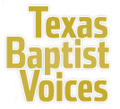For the past two weeks, my Ministry Formations class has been talking about what it means to be a Baptist.
 Meredith StoneWe have talked about our Reformation roots, our English roots, Smyth and Helwys, Roger Williams, the Great Awakening, the unfortunate circumstances surrounding the slave-era formation of the Southern Baptist Convention, other Baptist conventions, the SBC conservative resurgence, and the structure and ministry of the Baptist General Convention of Texas, from which these students receive scholarships and support.
Meredith StoneWe have talked about our Reformation roots, our English roots, Smyth and Helwys, Roger Williams, the Great Awakening, the unfortunate circumstances surrounding the slave-era formation of the Southern Baptist Convention, other Baptist conventions, the SBC conservative resurgence, and the structure and ministry of the Baptist General Convention of Texas, from which these students receive scholarships and support.
This week, we looked at the Baptist Faith and Message.
Before diving into each of the individual topics addressed in the Baptist Faith and Message, I began by describing the differences between confessions and creeds.
 Definitions
Definitions
I told them: “A confession is something that a group of people have chosen to confess about their generally accepted beliefs. A creed is something that a group of people have decided will be necessary beliefs in order to be a part of their group.”
We went through some items in the Baptist Faith and Message and then began to discuss the article titled “The Family,” which is included in the 2000 version but not 1963. I described how the BGCT did not adopt the 2000 version of the Baptist Faith and Message, which included this amendment, but on its website the BGCT does emphasize resolution statements passed by the convention on homosexuality.
After we read through some of those statements I told the class: “For a church to choose to affirm same-sex marriage or advocate for full inclusion of LGBTQ persons in all areas of leadership in the church is a fellowship/non-fellowship issue for the Baptist General Convention of Texas. A church’s position on this issue is defining for their ability to cooperate with the BGCT.”
Innocent question
At that moment one of my students raised his hand. When I called on him he asked an innocent question, “If this is a fellowship/non-fellowship issue, then doesn’t that make it a creed?”
This student and the church he attends do not support biblical interpretations that affirm same-sex marriage or the full inclusion of LGBTQ persons in the church. Yet from his perspective, when a single issue becomes a matter of fellowship, then a move is made toward creedalism.
It is difficult to know on how much we need to agree in order to remain in partnership with one another. I am more than sure there are Texas Baptist congregations and congregants who do not agree with 100 percent of the words, doctrines and interpretations represented in the Baptist Faith and Message or every resolution passed by the convention. Yet most of them still choose to partner with and send support to the BGCT, and the BGCT still continues to accept their money and seat their messengers.
Drawing lines …
So how do we decide which issues are worthy of drawing lines?
If Texas Baptists continue to be a confessional people, we must consider the ramifications of the lines we draw for partnership, affiliation and fellowship.
Why is one issue more important than another? Should other issues also, or instead, be defining issues for harmonious cooperation?
Or if any issue is grounds for disfellowship, then are we defying the freedom that has defined our Baptist heritage and moving toward creedalism?
As my student illuminated with his innocent question, now is an important time to consider what it means to be a Baptist.
Meredith Stone is director of ministry guidance and instructor of Christian ministry and Scripture at Hardin-Simmons University’s Logsdon School of Theology. She is a member of the Baptist Standard board of directors.















We seek to connect God’s story and God’s people around the world. To learn more about God’s story, click here.
Send comments and feedback to Eric Black, our editor. For comments to be published, please specify “letter to the editor.” Maximum length for publication is 300 words.